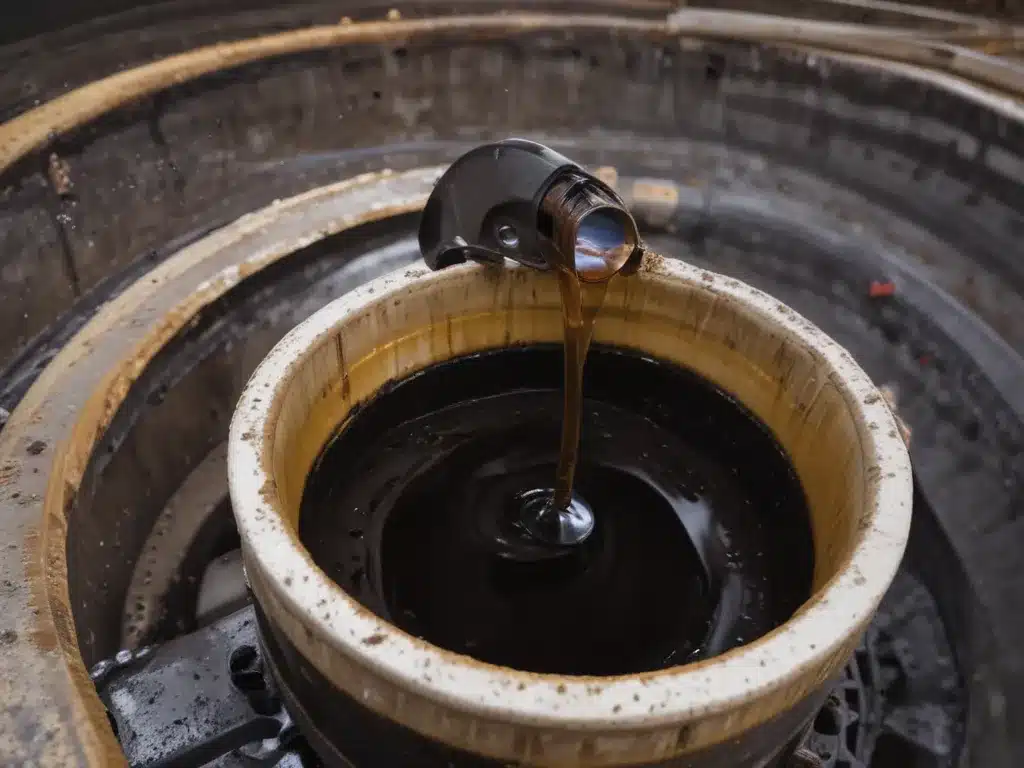
Understanding the Perils of Oil Sludge
As a car enthusiast, I’ve learned that one of the most insidious enemies of a vehicle’s well-being is something called “oil sludge.” This gooey, thick substance can wreak havoc on an engine, clogging vital components and causing all sorts of problems. I’ll never forget the time my buddy’s car suddenly started running rough – he brought it in, and the mechanic traced the issue back to a nasty case of sludge buildup. Turns out, he’d been skimping on oil changes, and the cheap conventional oil he was using just couldn’t hold up. Needless to say, that was an expensive lesson!
So, what exactly is oil sludge, and how does it form? Well, it’s essentially a byproduct of oil degradation – as the oil breaks down over time, it can leave behind thick, gummy deposits that accumulate in the engine. This can happen for a variety of reasons, like infrequent oil changes, using the wrong oil type, or simply driving in very harsh conditions. And the consequences can be dire – sludge can clog oil galleries, restrict oil flow to critical components, and even lead to catastrophic engine failure if left unchecked.
That’s why it’s so important to be proactive about oil maintenance. And in my experience, making the switch to a high-quality synthetic oil can be a game-changer when it comes to preventing sludge buildup. Synthetic oils are engineered to be more resistant to breakdown, with superior heat and oxidation stability that allows them to better withstand the rigors of modern engine operation.
The Synthetic Oil Advantage
But don’t just take my word for it – let’s dive into the science behind why synthetic oils are superior when it comes to sludge prevention. Traditional mineral-based oils are made from, well, crude oil – a complex mixture of hydrocarbons that can become contaminated and break down over time. Synthetic oils, on the other hand, are created from pure, engineered base stocks that are designed to maintain their integrity under high temperatures and pressures.
Synthetic oils also contain advanced additive packages that help them resist oxidation, deposit formation, and viscosity breakdown. These additives act like tiny sludge-busting warriors, keeping the oil fresh and protecting critical engine components. And because synthetic oils can maintain their properties for longer, you can go further between oil changes without worrying about sludge buildup.
But the benefits of synthetic oil go beyond just sludge prevention. These high-performance lubricants can also improve fuel efficiency, reduce engine wear and tear, and even enhance power output. I recently switched my daily driver to a fully synthetic oil, and I’ve noticed a real difference in how smoothly and responsively the engine runs. It’s like a new lease on life!
Real-World Sludge Scenarios
Of course, the whole sludge issue isn’t just theoretical – I’ve seen it play out in the real world time and time again. Take the case of my buddy Steve, for example. He inherited his grandfather’s old Toyota Camry, and he was determined to keep it running forever. But he got a little too zealous with the oil changes, stretching them way past the recommended interval.
Sure enough, after a couple of years, that engine was coated in a thick, nasty sludge. The oil galleries were clogged, and the poor car was chugging and sputtering like an asthmatic lawnmower. Steve was devastated, but luckily, we caught it in time before any major damage was done. We drained the oil, flushed the system, and switched him over to a high-quality synthetic. Within a few hundred miles, that Camry was running like new again.
Another example that really sticks with me is my neighbor, Mrs. Johnson. She’s an elderly lady who’s had the same Honda Civic for what feels like forever. I’m always impressed by how well she’s maintained it over the years – until one day, I noticed the engine sounding a bit off. Turns out, she’d been using the same cheap conventional oil for ages, and it had turned into a nasty sludge slurry.
We took the Civic in, and the mechanic had to do a full sludge removal job. It was a messy, labor-intensive process, and it ended up costing poor Mrs. Johnson a pretty penny. But once it was all said and done, that Civic was purring like a kitten again. She was so relieved, and she’s been religious about her oil changes ever since.
Synthetic Oil: The Long-Term Solution
These stories really highlight the importance of proactive oil maintenance, and the benefits of using a high-quality synthetic oil. Sure, synthetic oils might cost a bit more upfront, but in the long run, they can save you from expensive engine repairs and extend the life of your vehicle. And let’s be honest – when it comes to our beloved cars, isn’t that what we all want?
I know it can be tempting to just go with the cheapest oil option, but trust me, it’s not worth the risk. Sludge buildup is a silent killer, and it can sneak up on you when you least expect it. That’s why I always recommend that my friends and family make the switch to a fully synthetic oil – it’s just not worth the hassle and heartache of dealing with a sludged-up engine.
So, if you want to keep your car running strong for years to come, do yourself a favor and ditch the conventional stuff in favor of a top-notch synthetic. Your engine will thank you, and so will your wallet in the long run. Just remember to stay on top of those oil changes, and you’ll be well on your way to sludge-free bliss.


